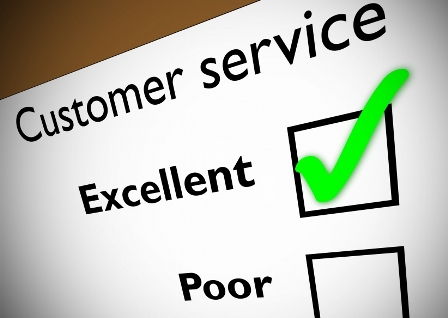
Could it be that our lives and careers are simply a reflection of our Words?
►Is the difference between a millionaire and a billionaire the words they know and use?
►Could the difference between a happy person and depressed person simply be the words they chanted to themselves?
Venue ; Best Western Plus Hotel Westlands - Nairobi
Date; 26th To 30th January 2026 (Five Days)
.jpg)
Venue ; Best Western Plus Hotel Westlands - Nairobi
Date; 26th To 30th January 2026 (Five Days)
.jpg)
Your business would not exist without customers. And if you have customers, you have to have customer service. Everybody talks about the importance of good customer service, but few seem to follow through on it.
Recently, I had the opportunity to ask a few questions of communications expert in Africa I found out why she says, "Good customer service is no longer enough."
jr:Why is customer service so important to a successful business?
db: Customers have more options than ever before-and feel less loyalty. They want products and services fast, cheap, quick-from whoever will provide them. That means that the competitive advantage is now in your ability to KEEP customers and build repeat business. And the email mindset makes it even easier for customers to spread out their dissatisfaction. Make Customer Jones angry and chances are you've got a nasty rumor going around to ten of his colleagues that you're a lousy firm to do business with.
jr: What's your definition of good customer service?
db: Good customer service is no longer enough. It has to be superior, WOW, unexpected service. In a nutshell, it means doing what you say you will, when you say you will, how you say you will, at the price you promised-plus a little extra tossed in to say "I appreciate your business."
jr: How do you quantify it and measure it?
db: There are as many ways as there are businesses. You can use several criteria as your scorecard-decrease in written customer complaints, decrease in oral complaints, more referrals generated from your current customers, increase in the repeat business of your current customers, faster response time/turnaround time on orders, increased productivity and less rework on customer projects. There are many, many options. Part of our customer service consulting and training is to lead clients to determine how they personally want to evaluate. Evaluation costs time and money, but it's well worth it to see how you score.
jr: Is good customer service different on the Internet?
db: The primary difference is that you have difficulty in building rapport with customers because there are fewer occasions of real-time interaction. A second difference is that customers seem to be more fickle and hostile because they can chose to remain anonymous. They're in; they're out; they move on without a second thought. First impressions about how user-friendly your site is, for example, get translated to how user-friendly your products and services are in general.
jr: If good customer service is so important to a business' success, why do so few businesses have it?
db: Customer service is dependent on three things: customer-friendly policies set by the organization's executives, training offered to the staff, and the attitude of the staff about their own organization as generated by the way their company treats them. Let me elaborate on what happens if any of these are out of whack. If executives don't actually know/see how their policies get executed on the frontline, they're often shocked to discover the actual results of how the policies get carried out/enforced. If people aren't trained on specifics (not just smile and use people's names), they don't know how to build customer loyalty even when they want to. For example, you may tell a frontline staffer to acknowledge customers when they walk in the door. But they have to know HOW to acknowledge them. Is it appropriate to say, "Next" to the next person, thereby making them feel like a number rather than person that's being "processed." And finally, let me elaborate on how customer service becomes the result of poor employee treatment. In a nutshell: employees can be spiteful. If they get pushed around and treated unfairly, they "get even" by doing things to drive your customers away (act sullen, air your dirty linen, forget to call back or follow up).
jr: I often feel the retail industry has the worst customer service. Is this supported by fact?
db: I don't know about any research that says retail customer service is worse than that, say, offered in a stockbrokerage firm. But the reason a retail environment pops into mind so often when mentioning poor customer service is that their customer base is so broad and poor service is so easy to spot. For example, you don't realize that the stockbrokerage firm didn't send you the correct paperwork on your new account until two weeks later-and they may or may not admit fault. Behind-the-scenes foul-ups are difficult to trace to discover who did or didn't do/communicate what was needed. But with retail, all the foul-ups are readily and immediately apparent when you walk in the door: The sales associate is on the phone to her mother. No one called/asked my name. No one asked the right questions to discover my needs. No one smiled. The clerk didn't know the merchandise. Nobody could make a decision when I asked for an exception to policy. All those issues glare at the customer immediately.
jr: What are some examples, which you have encountered, of really good customer service? Of really bad? What could the bad ones have done differently?
db: We recently had a great example of above-and-beyond-the-call-of-duty service. One of our trainers was staying in a hotel in Kampala. When she went to her rental car the first morning of our workshop, she discovered a dead-battery. The hotel desk clerk heard her make a desperate call to the rental car agency and heard them tell her it would be two hours before they could come out. They offered no other option for her to get to the seminar. The hotel desk clerk overheard the conversation and volunteered to lend our trainer her personal car for the day, saying it would simply be parked in the lot all day and she had no use for it. My bad example-the same situation. The rental car agency. In effect, they've said, "You've got a problem. Here's our policy. Like it or rent elsewhere next time. Instead, they should have had in place a system for faster response time. In lieu of that, they should have had approval and foresight to offer other options such as suggesting the guest take a taxi to work and offering to reimburse the fare.
jr: If I, as a manager, have just taken over an operation with a reputation for less than ideal customer service, what can I do about it? What should I do first?
db: Fix it and then brag. Not the other way around. The mistake most new managers make is to take over the job and announce to their public/customers their intentions to improve customer service. But they don't yet have new systems and policies and training in place, so nothing really changes for the customer. Customers' high hopes are dashed. Then they become even more hostile and disappointed in the service. So, the first step is to fix the problem, train the staff to deliver better service, and THEN announce the change to your customers as you set about proving it to them.
jr: If I have had responsibility for that operation for some time, and this interview shows me I need to improve, is the plan any different than in your previous answer?
db: Same. Just put your money, time, and commitment where your mouth is. That's often the difficulty. Everybody believes in good customer service--in theory. The real difference develops when people actually commit to carry out their intentions.
Here is your opportunity to really make a difference in the customer service your company provides. Make sure your people actually commit to carrying out their intentions
Good Luck!
Compiled by,
Daisy Wairimu..
Clients Relations
Dolphins Training & Consultants ltd - Dolphins Group.
Venue ; Best Western Hotel Wstlands - Nairobi
Date; 26th To 30th January 2026 (Five Days)
.jpg)
Venue ; Best Western Hotel Westands - Nairobi
Date; 26th To 30th January 2026 (Five Days)


.jpg)
.jpg)

.gif)


.jpg)

.jpg)


.jpg)